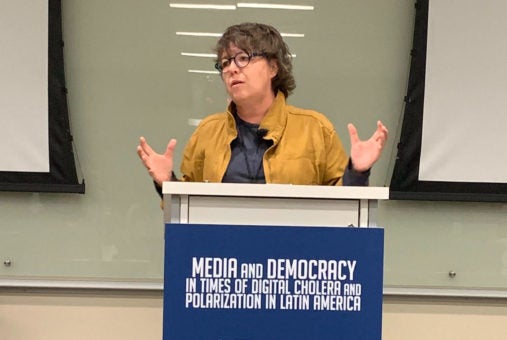
Brazilian journalist Vanessa de Macedo Higgins Joyce focused on Argentina, Brazil and Colombia and found ways in which digital news media can build consensus in polarized societies.

From producing more solutions journalism stories, offering audiences spaces to participate in public life or reporting with a different approach from “them vs. us,” ISOJ panelists offered paths out of global polarization.

LLILAS Benson Latin American Studies and Collections and the Knight Center for Journalism in the Americas at the University of Texas at Austin will host a webinar on polarization, disinformation and the role of the press in protecting democracy and freedom of expression in the region.

Smith said that reporters are having to adapt to a new reality, trying to come up with different ways that simulate in-person conversations with voters

In Mexico, when a journalist asks the president a critical question during his press conferences, he is then attacked on social networks explained Mexican journalist Gabriela Warkentin of W Radio during the event “Media and Democracy in Times of Digital Cholera and Polarization in Latin America.”
The prohibition of the press from entering and covering the Venezuelan legislative body, which began a new session in February of this year. The situation, widely criticized by various organizations, is symptomatic of the tense state in which the country's media finds itself, even two months after elections put President Nicolás Maduro into power.
Already marked by polarization during the administration of Hugo Chávez, the media environment in Venezuela is now fueling political disputes following the troubled presidential election on April 14, between Chávez's appointed successor, Nicolás Maduro, and opposition candidate Henrique Capriles.

In polarized societies that are also home to authoritarian or populist governments, journalists and media outlets in the country must work together and avoid falling into a narrative of hate coming from officials.